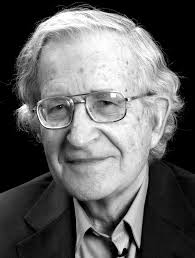 By Hannah Hecht–Noam Chomsky, world-famous linguist, U.S. foreign policy critic, and author of over 100 books, Skyped in to give a question and answer session in Morningside’s very own Yockey room earlier this week. He answered questions from Morningside students, faculty, and alumni in an interactive virtual setting.
By Hannah Hecht–Noam Chomsky, world-famous linguist, U.S. foreign policy critic, and author of over 100 books, Skyped in to give a question and answer session in Morningside’s very own Yockey room earlier this week. He answered questions from Morningside students, faculty, and alumni in an interactive virtual setting.
Most of the Morningsiders’ questions regarded Chomsky’s opinions on U.S. foreign policy. The first question of the session, posed by faculty member Patrick Blaine, asked him for his perspective on the U.S.’s reaction to Crimea’s recent decision to secede from the Ukraine and become an independent state, with the goal of eventually being annexed to Russia.
Chomsky said that while the actions of the Russian government to persuade Crimea to secede were in violation of international law, the protestations of the U.S. government are actually hypocritical. According to Chomsky, the U.S. disregards the same international laws that prevent foreign armies from marching across international borders all the time.
“It’s remarkable that denunciations by U.S. officials and commentators pass without critical evaluation,” Chomsky said.
He compared Russia’s involvement in Crimea to the U.S.’s involvement in Cuba at Guantanamo Bay. Except, according to Chomsky, Russia’s involvement in Crimea has a much stronger case.
“If the U.S. had, say, Russia or China marching up into our country through Mexico, we wouldn’t be too happy about it,” he said.
And, for Chomsky, Russia’s vulnerability at the Ukrainian border is the reason why Russia is pushing for Crimea’s reunification with Russia.
Another question, posed by student David Riveros Garcia, asked Chomsky whether citizens of a country should feel an obligation to have a certain level of civic literacy. Chomsky answered that each person’s degree of responsibility to civic knowledge and engagement should be decided by his or her degree of privilege and opportunity.
“If you work 50 hours a week just to feed your family, you aren’t very privileged, so you have no opportunity to become civically engaged,” he said. “However, if you are, say a university professor or a university student, you have a lot of privilege, so you should use that privilege and opportunity to gain an understanding and try to help people who lack in privilege. I mean, that’s just elementary morality.”
Another student asked Chomsky about the media and the material it hides from American citizens. Chomsky explained that there are tons of examples of things that every citizen should know about that end up getting pushed to the back pages of the newspapers, or don’t get reported at all. He used the last financial crisis as an example. According to him, when AIG collapsed and was about to bring down the entire U.S. economy with it, the government bailed it out to save the economy. However, he said, the very next year the executives were given huge bonuses. Leading U.S. economists justified these bonuses by saying that the bonuses were a part of the negotiated contract. However, according to Chomsky, the government doesn’t honor all of the contracts it makes. Recently, Illinois passed a law that said that the state wasn’t going to pay the pensions of its public service workers.
“Why is it that we don’t have to hold up our contract with the Illinois public service workers, but the AIG executives have to be paid huge bonuses because of their contract with the government?” Chomsky asked.
The virtual meeting had been originally scheduled as a lecture over “The Power of Words.” Chomsky, world-renowned as the modern father of linguistics, is one of the world’s foremost authorities on subject.
“I wish he would have lectured, rather than turn it into a full-on Q and A,” said sophomore history major Nick Misukanis, “It would have been cool to hear about linguistics from Chomsky himself.”
However, despite the change in format, students, staff, and faculty alike regarded the question-answer session as a success. Misukanis thought that Chomsky’s words offered an eye-opening experience for all of the students in attendance.
“It was fantastic that we got to hear a world intellectual’s call-to-arms for students and young people to spread knowledge and keep themselves from being completely blinded by the media,” Misukanis said.
The event was a part of the Hickman-Johnson-Furrow Learning Center Virtual Lecture Series. The final installment of this year will feature Peter Suber, a philosopher specializing in the philosophy of law and open access to knowledge. The lecture’s topic will be “What is Open Access?” and it will take place on April 14 at 7 p.m. The campus location has yet to be determined.

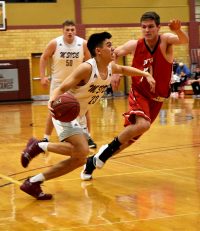
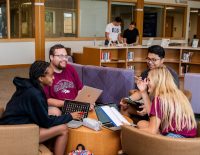
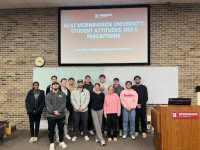

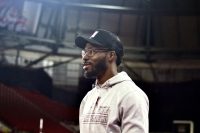
Leave a Reply